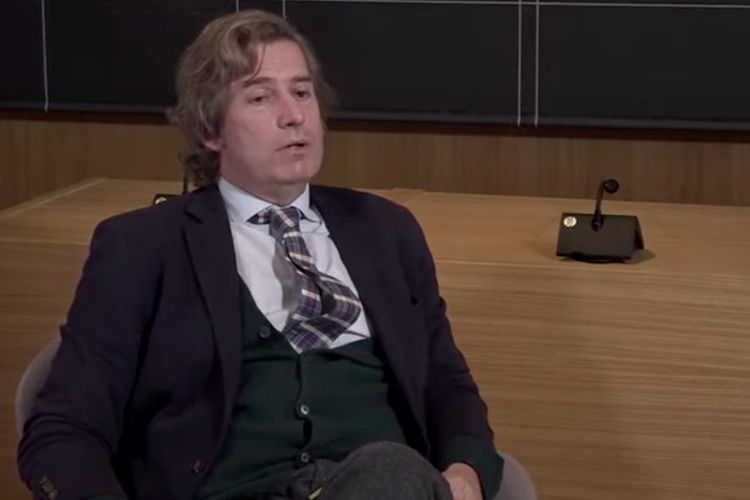-TEXT: Rafael Miner
Misery and dignity; the progress (or not) of humanity, the strongest and the weakest, or exemplarity, are some of the ideas that have marked the dialogue between the writer and philosopher Javier Gomá and the professor of Contemporary History Pablo Pèrez, held at the Madrid campus of the University of Navarra.
"Dignity is the most revolutionary concept of the 20th century." philosopher, jurist and essayist Javier Gomá, director of the Juan March Foundation, has pointed out on several occasions. His reflection led him to write a book last year entitled precisely this, Dignitywhich has gained special prominence in recent times.
Gomá has had the opportunity this week to refresh them and apply them to the phenomenon of the pandemic which, in his opinion, is a pandemic, "has had an extraordinary impact on the ultimate truths that have to do with dignity." "We have made an enormous sacrifice in the name of dignity for those who were most exposed to the virus, but dignity has also been put to the test in the death of other people in conditions that today we would describe as subhuman."said in a conversation with Professor Pablo Perez.
As of March 14, with the declaration of the state of alarm and confinement, "there was, from the ethical point of view, the fact that the entire population had to yield to the equivalent of house arrest and the ruin of business, to the detriment of the active classes, and to the benefit of the passive classes, more needy and weaker. There was, therefore, an act of tribute to the initial dignity."added Javier Gomá.
But also, he added, there have been other times when there has been "a questioning of this dignity". For example, "the sad death of people whose right to have a good death has been taken away and the rituals normally used by the survivors to consecrate the memory of the deceased. And this is an attack on dignity".
Humanity progresses
The dialogue between the speakers, enriched by questions on the network, addressed substantive issues, with a historical and philosophical approach. A well-known phrase by Ortega y Gasset, "what's wrong with us is that we don't know what's wrong with us", was the motto chosen to start the conversation, within the framework of the lecture series Stop & Think Now, which was presented by Pablo Pérez, professor and scientific director of the Culture and Society Institute of the University of Navarra.
The commotion caused by the extension of Covid-19, the unexpectedness of the event, and the fact that it affects everyone at the same time, deserves a far-reaching reflection, said Pablo Pérez, referring to the contrast between the idea of misery and the idea of dignity analyzed by Javier Gomá.
The perplexity and skepticism that this pandemic has provoked in some people can lead one to think that humanity is regressing. However, Javier Gomá considers that throughout history, from the times of Aristotle, Cicero, or the Middle Ages, in which private interest yielded to the general interest, of the polis, "there is no doubt that the right of the weakest has been progressing". in large pockets of fragile and vulnerable people.
In his opinion, if you ask the poor, the sick, the child, the elderly, the woman, the person with a psychological handicap, the prisoner, the unemployed, etc...,"in what era would you like to live, I would answer without a doubt that now". "The progress of culture has been verified in recent times as a hymn to dignity, with all the drawbacks I am willing to discuss."
Liberty and equality were the subject of conversation and questions, as well as fraternity. Looking back to the French Revolution, and in relation to a question about the latest encyclical of Pope FrancisFratelli tutti, Gomá pointed out that the risk of the extinction of the human species "has awakened us more to the feeling that we all belong to one race, the human race, with one principle, dignity. And in that race, in that dignity, we are united"..
His final reflections focused on the concept of exemplarity and the use of freedom. "There are no areas exempt from the influence of example: every example is either positive or negative.". (In relation to the pandemic) "How freedom is used is no longer a matter of privacy. Positive or negative behavior can contribute to someone's death. You can infect a grandparent, or a child, or the person with whom you have lived. And you can contribute to a society behaving in a civic way or in a barbaric way".







